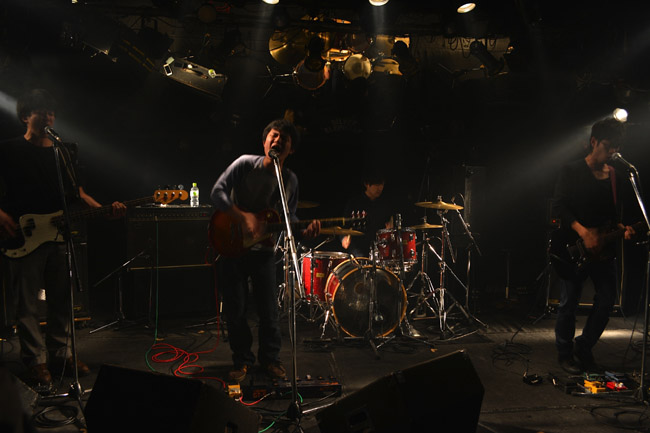THE JAPANESE CLUB SCENE

Potlucks
The Pay-To-Play System- A Hurdle For Japan's Creatives
by Wade T Oberlin
(February 2014)
"I just don't understand why we thank the guy we have to pay to play for," my fellow expatriate friend Kevin says after exiting a Japanese venue after the final band of the night has finished, "after he set us up on a bill with a bunch of shitty bands. They sucked. I just don't get it." Kevin drums with one of our local friends, Machan, in the band Supermeme. They played third on a bill with five or six acts and had to wait until all sets finished before they could pay up.
Our friend Masa, who plays in his own band Potlucks, simply responded, "That's how it works here in Japan."
After being to venues in Shinjuku, Koenjii and Kichijoji to see live shows, a few things became apparent that our local friends in Japanese bands have also brought to light; creating a stir in underground music is very difficult in Tokyo's constricting club scene. To people like Kevin, who frequented shows and played music in an assortment of bars, clubs, public bathrooms and vacant parking lots back in the states, this is troublesome.
On the streets of Tokyo, small live music venues are numerous and it's easy to see how these local spots vary from places in the states or elsewhere abroad; these live houses hire staff engineers and typically provide a drum kit, large amps and other necessities that most bands elsewhere in the world would have to lug about and cart in themselves. This set-up is common even in the smallest dives in the city.
Okay, so that may be an excuse, albeit flimsy, as to why people need to pay up if they don't bring a huge crowd in. These bands ARE the customers, more so than the folks in the audience. Young upstart bands might be lucky to bring in a handful of people. But the other problem presented by this pay-to-play system that is set in place is that... well, you tend to get people with more money playing more often. And as history has shown, middle-class music is just not as interesting as lower class art on stage.
So where is the disconnect here? In the States, the view on most Japanese bands is that they are either pretty pop stars or rock and rollers turned on their heads... Noiseniks. For the latter, Japanoise is a popular catch-all for people on the outside to call Japan's most interesting and covered underground music commodity. But what most folks don't see is that these bands known for their crazy antics and distinctly zany Japanese behavior had to achieve popularity elsewhere before people in their homeland even thought about putting them in as a headliner in a festival.
But let's not talk about festivals. Back to the clubs. James Hadfield wrote up a great article here at livemusicexchange.org that explains the many reasons why pay-to-play exists, including some pros and cons. Most reasons are cons though, especially if you just want to catch a good, solid local show! Most of the acts you will see on a bill on a typical night aren't connected to one another. Rather, they are all paying customers set up by the management to play on that specific night. While this potentially could lead to many different interesting acts, potentially, a lot of acts end up being quite cookie-cutter. Rather vacuous indie-rock, mid-range metal. Acts that sound like they're s'posed to, that will probably have a bigger audience.
When I asked about the idea of a music press worthy of reading here in Japan, the answer I got was that most of them don't read music papers provided by the Japanese music industry or that they don't read about music here at all. Truth is, there are no real big websites or fanzines really uniting any sort of working class Japanese underground network together around Tokyo. It seems that to play how you want with who you want, it takes great effort in this gridlocked city, especially if you have little Yen.
But what about outside? Tokyo is of course a big place. Most of my musician friends hail from Ome, a town on the fringe if not considered outside of the greater Tokyo area. It shares the railway line heading towards Tachikawa, the Chuo line, which heads north and then juts eastward towards Shinjuku. The ride is about an hour, not a bad transit. On the way and close to Ome by a few stops is Fussa, and a fair walk from that is where Kevin and I live; Yokota Air Base. Fussa (pronounced who-saa) is a rough town, as are most towns supporting a military base. It has a long convoluted history with the military, and I'm sure it will continue to be that way despite most people's interests in getting on and getting along. It was even documented as some kind of fresh rock'n'roll hell back in the mid- 70's in the short novel Almost Transparent Blue by Ryu Murakami (ED NOTE: great book, read it now!). Fussa locals kick it with Doors and James Brown records (and even listen to FEN... Far East Network... which is now called AFN... American Forces Network... which is *gasp* where I work) whilst getting loaded, shooting up and giving a generally nihilistic outlook towards their lives in the shadow of the military installation. Not that that stops them from mixing with American's from base, usually sexually and quite viciously.
I read the novel (available in English) when one of my buddies tipped me off. It's amazing how it still parallels our lives here. Well, at least the tension and discomfort of the general surroundings and the times spent listening to music. We hear enough about the "action" that goes down at Bar Row, a stream of bars mostly run by Filipinos and Japanese catering to American Forces. Upon first arriving, it's natural for an American to leave the base and find themselves in the dirty alley a few blocks down. It is, in fact, where I first met my musician friends. A venue in Bar Row that acts as one of the only live stages in Fussa called Chicken Shack is located right in the middle of these establishments, and it's free to play.

Chicken Shack Fussa website
A band that's in it for the music just wants to play, but what kind of audience does a band want? It can't be one envisioned in the head. In the head of a Japanese musician, I bet their first thought isn't to play for G.I.s. It just has to be what you can get out of friends, promotion, touring and recording. Good luck with touring and promotion in Tokyo or further out in the land of the rising sun. No one can help you but yourselves, and you better be well funded until some changes can be made. For these Ome bands and others on the fringe of Tokyo metropolis with little Yen to their name, the satisfaction of playing outside of their bubble is already taken down a few notches right out of the gate. And the creatives with money to put down? Audiences can catch those guys in between some Dave Matthews types.
Masa's group, Potlucks, plays a show early this year that they will have to pay for. It won't be at the Chicken Shack. Potlucks' last show was more than a year ago live, but I have heard their new material from practice sessions created in a studio over the past few months. The fuel for their change and development stemmed from Masa's recent trip to the United States, where he visited and played music with a close musician friend of his in Chicago, smoked dope, developed a fondness for Zappa and a new affinity for music listening in isolation and stillness. Sounding first to me like a group in a Superchunk-ian vein, they have now grown into something I suspect will be more rhythmically complex and adventurous (i.e. heady). It'll be interesting to see their development over the past year take form on stage, but it will also be interesting to see what's in my friend's peripherals. Will they play with jambands? Other frustrated creatives? How long can momentum be sustained under these conditions of bad billing and paying to play?
Final thoughts, until after I see this upcoming show; I've been reading up on SST, most recently the Joe Carducci memoir Enter Naomi. I've read Get In The Van, seen numerous documentaries like Decline of Western Civilization and Reality 86'd. From a quote, what great endurance for them to "keep... plowing... through... the shit." Traveling the states or anywhere else is different from Japan. So are the rules of how to put on a show and let's not forget about the total difference of mentality. Respect. Respect taken to such lengths that it may wrench their guts to accept some things as they are. For all those wild men and women of Japan who made their names on the fringe and around the world to make Japan such an interesting place for music as it stands, I salute you. Your kind of endurance is a unique one.
Links of Interest:
* Potlucks' Twitter account
* Ryu Murakami's Almost Transparent Blue
* Supermeme's Twitter account